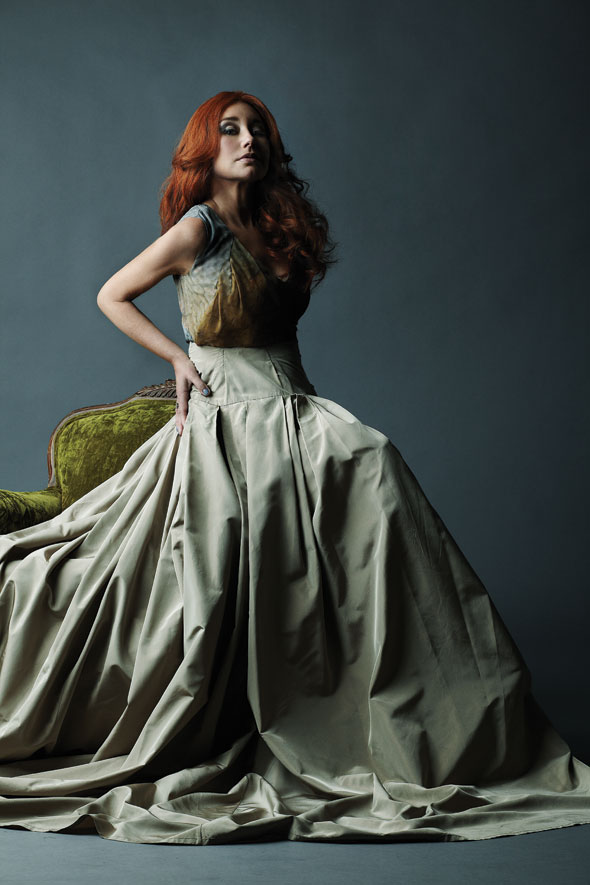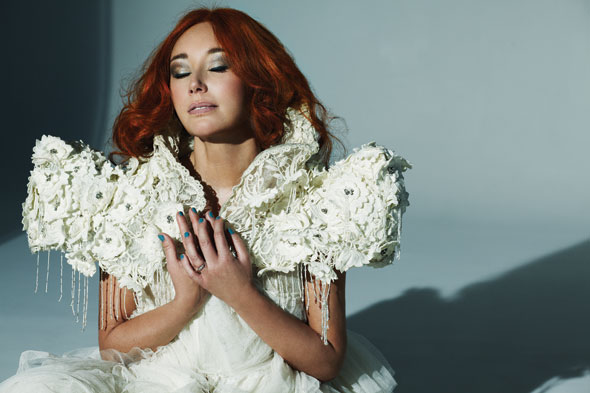
Top by Sally LaPointe, full skirt by Carolina Herrera
Tori Amos became a force in popular music with Little Earthquakes, an album full of confessional songs that balanced strong melodies with even stronger emotional content, including “Me And a Gun,” a graphic song about rape and abuse. Her slightly quirky melodies and emotional honesty won her legions of fans. She presents a woman’s view without the soft focus approach of most pop artists. Amos started out as a classical prodigy, winning a full scholarship to the Peabody Conservatory when she was five, although she was soon dropped because of her interest in pop music. She returned to her classical roots with Night of the Hunters in 2011, a song cycle built on themes from Bach, Satie, Mendelssohn and other classical composers. On her current album, Gold Dust, she reinvents 14 songs from her back catalogue with new arrangements provided by the Metropole Orchestra, a classical ensemble from the Netherlands.
Do you have any obsessions?
Tori Amos: I’d have to say shoes have been a passion for a long time. I don’t know how many pairs I have. I haven’t tried counting them recently, because they’re bi-continental. Some are in the US, some in England and Ireland in tour cases and boxes, so they don’t get attacked by mold. There are show shoes and everyday shoes that usually have an extra high heel to give you a little lift on stage, but you don’t want to wear them very long or try walking a long way in them. We bought a place in England with a barn behind the house. My husband said he bought it so he’d have a place to quarantine my shoes.
I had them cataloged at one time. I took a picture to put on each box, but that system hasn’t been updated. Maybe on the next holiday break I can do it with my daughter Natashya. She’s 12 now and wears the same shoe size, but I tell her she should go to work and earn some money and start her own collection.
Gold Dust isn’t really a Greatest Hits album. What was the process of choosing the songs?
We weren’t thinking of making an album with the Metropole Orchestra. They invited me to play one show with them, so the repertoire was chosen using songs that worked well together. It went so well that my label decided the performance had to be captured properly, so the next step was choosing more songs for the album. I’d never recorded live before. I usually record my piano and vocals and the horns and strings are added later, playing along to my tracks, with me sitting there as a producer. It was intimidating, but as I got to know them and the conductor, Jules Buckley, I realized the orchestra was a creature, a dragon and the conductor is the dragon tamer and I have to make sure I’m sitting properly to ride the dragon with my high heels and piano. The dragon’s like a train going 220 miles an hour and if you fall off, you have to start over. That’s happened on occasion during the live performances we’ve done, but usually at the beginning of the shows, so it’s OK, but once you saddle up, you better be good.

Beaded cape by Sorapol.
When you started out, did you consciously choose to be raw and honest in your songwriting, or was it something you had no conscious control over?
After my band Y Kant Tori Read failed, I asked myself what kind of artist I wanted to be. After years of sending in demos and years of rejection, starting around age 14, I began to see I wasn’t going to get a record deal if I wrote what people wanted to hear. When a review called the album something like ‘bimbo music,’ I realized I didn’t have the power to make anyone listen to my music. However, I did have the power to make the music I wanted to listen to, regardless if anybody else chose to listen. That became my commitment. As a minister’s daughter, I knew how patriarchy worked and how shame operates. My quest was to read other myths and read Christianity as just another mystery, to detach from the charge that was so much a part of the writing process. Religion and belief and the power that our beliefs can have became a big part of my subject mater. You are what you believe.
Has being a mother changed your relationship to songwriting?
It’s changed everything. You’re a mom who wants to have a close relationship with your child, but when you’re an artist, you’re not always emotionally available. Becoming a mom makes you realize that the world doesn’t revolve around you. A child wants a mom who is not overly critical and a musician has to be hypercritical, so I take myself off when I need to write.
I took my daughter on tour until recently and got to see the world through her eyes, which gave me a different angle on things. To children, every experience is new; they can have a starry-eyed wonder about things. I found I could get into that state by observing her carefully and travel into that creative dimension, without using spirits or drugs and without getting hung over. But you have to keep your antenna up and be a willing observer. If you’re texting all the time, or talking all the time, the muses can’t get through. They go visit some other writer.
Text: J. Poet
Photography: Christian Conti
Stylist: Holly Suan Gray
Photo Assistant: Tom La Sala
Digi tech: Camilo Fuentealba
Make Up Artist: Karlo Beau
Hair Stylist: Barry Lee Moe

